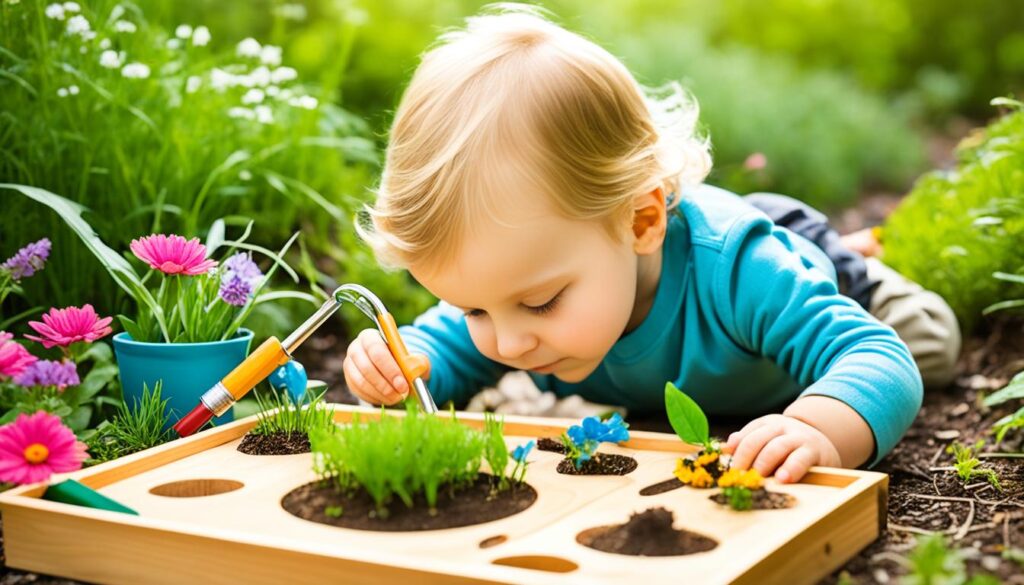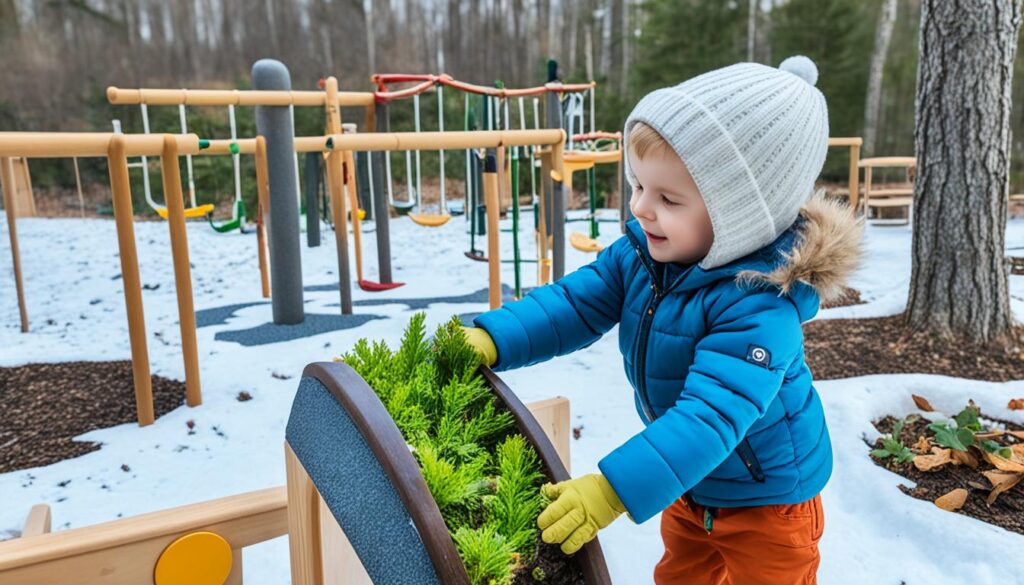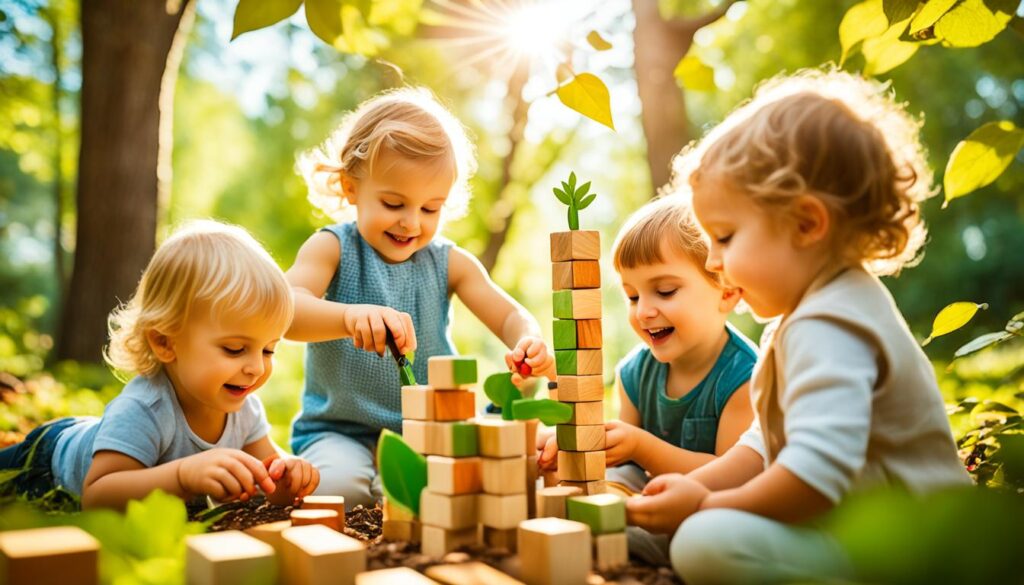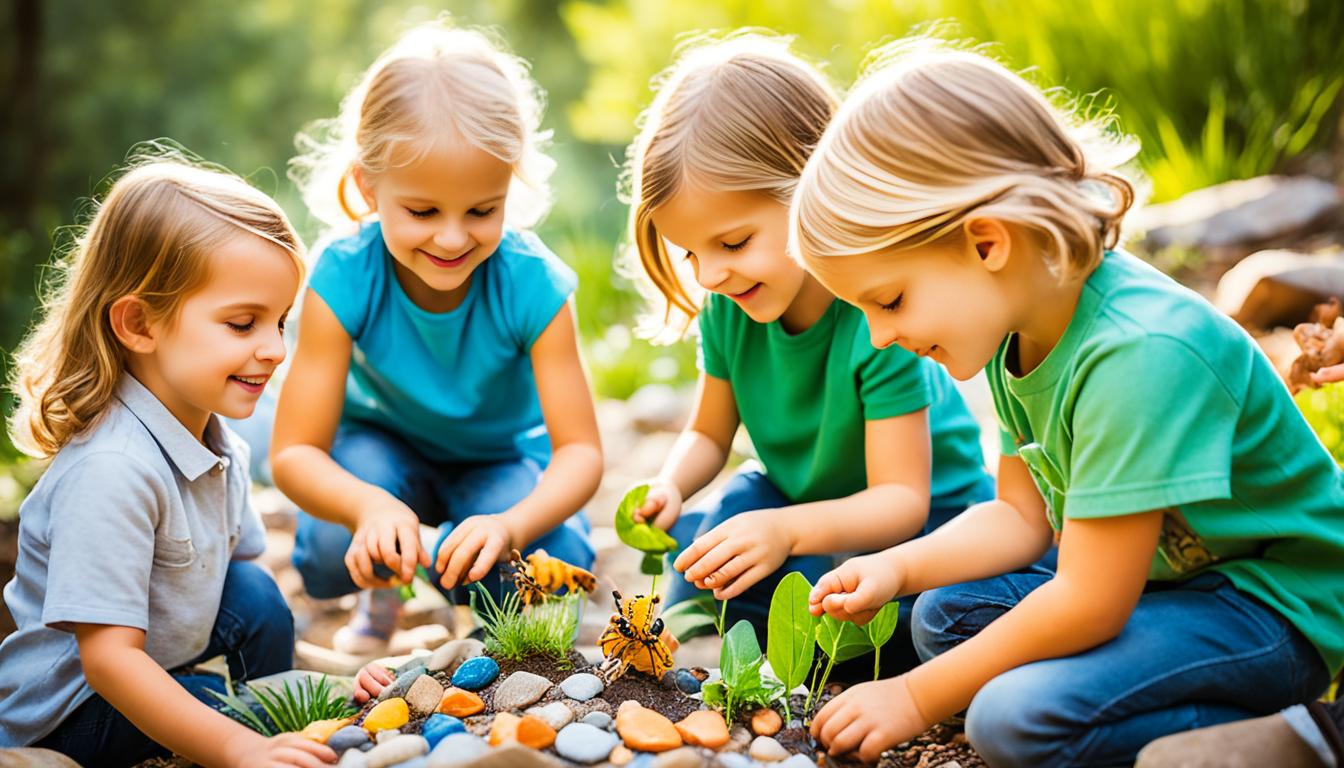Did you know that children today spend an average of over seven hours a day in front of screens? With technology becoming an integral part of their lives, it’s more important than ever to provide children with opportunities for outdoor play and connection with nature. Montessori outdoor play offers a holistic approach to childhood development, combining hands-on learning, sensory exploration, and a love for the natural environment.
Key Takeaways:
- Montessori outdoor play nurtures children’s mental, cognitive, and physical development.
- Setting up a Montessori outdoor play area involves creating a dedicated space with nature-inspired elements.
- Even without specialized equipment, there are plenty of Montessori outdoor activities that promote exploration and learning.
- Montessori outdoor toys and materials play a crucial role in engaging children in outdoor play.
- Montessori outdoor play offers numerous benefits, including fostering independence and a love for learning.
Setting Up a Montessori Outdoor Play Area
Creating a Montessori outdoor space is an incredible way to foster active play and exploration in children. Whether you have a spacious backyard or a small outdoor area, designing an environment that aligns with the Montessori philosophy is both exciting and rewarding.
One of the key elements of a Montessori outdoor play area is the inclusion of specialized equipment that encourages children to engage in physical activities. Consider incorporating climbing structures, swings, and obstacle courses to enhance their gross motor skills and promote active play.
To create a well-rounded Montessori outdoor space, it’s beneficial to divide the area into different zones. Each zone can cater to specific activities, allowing children to explore their interests while developing various skills. For example, dedicate an area for construction play, equipped with child-sized tools, building blocks, and construction materials. This zone encourages creativity, problem-solving, and fine motor skills.
Another zone can be designed to foster nature-based exploration. By incorporating sandboxes, water tables, and natural materials like rocks, shells, and twigs, children can get hands-on experience with sensory play and develop their understanding of the natural world around them.
Planting flowers and plants within the Montessori outdoor space provides an excellent opportunity for children to interact with nature. They can learn about the life cycle of plants, practice fine motor skills by planting and caring for them, and experience the sensory delight of touching and smelling the different textures and scents. It adds a touch of beauty and provides a calming and peaceful ambiance to the outdoor play area.
Remember, the Montessori approach emphasizes child-led learning, encouraging children to explore at their own pace. By creating a Montessori outdoor play area with diverse elements and zones, you foster an environment that promotes independence, curiosity, and a love for active play and learning.
Benefits of a Montessori Outdoor Play Area:
- Enhances physical development and gross motor skills.
- Nurtures a connection with nature and the environment.
- Promotes sensory exploration and cognitive development.
- Fosters creativity, problem-solving, and independence.
- Supports social interactions and cooperative play.
Creating a Montessori outdoor space that caters to active play and hands-on learning can be a transformative experience for children. It provides them with endless opportunities to engage with nature, explore their surroundings, and develop crucial skills that will benefit them throughout their lives.
Montessori Outdoor Activities Without Additional Elements
Even without specialized equipment, there are plenty of Montessori outdoor activities that can be enjoyed by toddlers and preschoolers. These activities promote sensory exploration, creativity, and fine motor skills development.
Riding a Balance Bike
One fun and beneficial activity for toddlers and preschoolers is riding a balance bike. This activity helps develop their gross motor skills and coordination while also instilling a love for physical activity. Check out this Balance bike on Amazon.
Taking Care of Plants
Children can learn valuable lessons about responsibility and nature by taking care of plants. Encourage them to water the flowers, observe plant growth, and even start a small vegetable garden. This hands-on activity teaches them about the environment and the importance of nurturing living things. Check out this kids raised garden bed on Amazon along with this Children’s Gardening Set.
Engaging in Mud Kitchen Play
Mud play activities are not only entertaining but also provide various sensory experiences. Setting up a mud kitchen in the outdoor play area allows children to explore textures, practice pouring and mixing, and engage in imaginative play. They can create muddy masterpieces and enjoy the tactile sensations of playing in the mud. Check out this affordable mud kitchen on Amazon.
Exploring Sand and Water
Another engaging activity is exploring sand and water. Provide children with buckets, shovels, and containers for sensory play. They can build sandcastles, experiment with water flow, or engage in pretend play activities like running a mini car wash.
These Montessori outdoor activities are ideal for toddlers and preschoolers as they encourage hands-on learning, imagination, and the development of essential skills. By incorporating these simple yet enriching activities into their outdoor playtime, children can have fun while exploring and connecting with the natural world around them. Check out this Sand and Water Activity table from Amazon.
Montessori Outdoor Toys and Materials
When it comes to Montessori outdoor play, the right toys and materials can make all the difference. These carefully selected items not only ignite children’s curiosity but also encourage their exploration, independence, and hands-on learning in the outdoor environment.
One excellent option is nature exploration kits, which typically include tools such as magnifying glasses and notebooks. These kits allow children to observe and document their findings while fostering a deeper connection with the natural world around them. Whether it’s examining insects up close or describing different types of rocks, these kits provide endless opportunities for nature exploration and scientific observation. Check out this nature kit on Amazon!
Another essential element of Montessori outdoor play is child-sized gardening tools. These pint-sized shovels, rakes, and watering cans empower children to take an active role in tending to plants and cultivating their own little outdoor garden. Through planting seeds, watering plants, and watching them grow, children not only develop a sense of responsibility but also learn valuable lessons about nature, patience, and the cycle of life. Check out this Kids Gardening Tools Set on Amazon.
Furthermore, outdoor building blocks are a fantastic addition to any Montessori outdoor play area. These blocks, made from durable materials such as wood or plastic, provide children with endless possibilities for creativity and construction. They can build forts, bridges, or even miniature cities, developing their spatial awareness, problem-solving abilities, and fine motor skills in the process. Outdoor building blocks encourage children to work collaboratively, communicate effectively, and think critically as they engage in open-ended play. Check out this Large Vintage Wooden Building Block set on Amazon.
All of these Montessori outdoor toys and materials promote sensory exploration, independence, and hands-on learning, aligning perfectly with the Montessori philosophy. By investing in these enriching educational tools, we can create a stimulating outdoor environment that inspires children to explore, discover, and learn through play.

Benefits of Montessori Outdoor Play
Montessori outdoor play offers numerous benefits for children. It allows them to connect with nature, develop physical and motor skills, enhance sensory perception, and foster creativity and imagination. Outdoor play also promotes independence, self-confidence, and a love for learning beyond traditional classroom boundaries.
When children engage in Montessori outdoor learning, they have the opportunity to explore and interact with the natural world. Whether it’s feeling the texture of grass or leaves, observing insects, or listening to the sounds of birds, outdoor play stimulates their senses and enhances their understanding of the environment. This sensory experience not only enriches their knowledge but also helps develop a deeper appreciation for nature and all its wonders.
Furthermore, outdoor play provides children with ample opportunities to engage in physical activities and develop their motor skills. From climbing structures to running, jumping, and balancing, children have the chance to strengthen their muscles, improve their coordination, and enhance their gross motor skills. These physical activities promote overall health and well-being, supporting their growth and development.
“The natural environment is the perfect setting for fostering creativity and imagination. When children have the freedom to explore, invent, and make believe, they develop their cognitive abilities and problem-solving skills in a natural and unstructured way.” – Maria Montessori
By engaging in Montessori screen-free outdoor activities, children also have the opportunity to disconnect from digital devices and immerse themselves in the present moment. This break from screens allows them to fully engage with their surroundings, engage in social interactions with peers, and develop vital social-emotional skills such as empathy, communication, and collaboration.
Moreover, Montessori outdoor play promotes independence and self-confidence. When children have the freedom to make choices, explore their interests, and overcome challenges in the outdoor environment, they develop a sense of autonomy and self-reliance. This sense of achievement boosts their self-esteem and encourages them to take risks and embrace new learning experiences.
Incorporating Montessori outdoor play into a child’s daily routine not only offers immediate benefits but also has long-term effects on their love for learning. By experiencing education beyond the four walls of a classroom, children develop a natural curiosity and a lifelong passion for exploring the world around them. This love for learning extends beyond academic subjects and instills a deep appreciation for the wonders of nature, creating well-rounded individuals who are eager to continue discovering and growing.
Montessori Outdoor Play for All Seasons
Montessori outdoor play is not limited to specific seasons. It can be enjoyed throughout the year by adapting activities to different weather conditions. By embracing nature’s ever-changing elements, children can continue to engage in meaningful and educational outdoor play experiences. Let’s explore some montessori nature walk activities, as well as montessori-inspired outdoor play equipment, that can add an extra layer of excitement to outdoor play.
Montessori Nature Walk Activities
One way to enhance the outdoor play experience is through nature walks. Encourage children to observe and interact with the natural environment, fostering a deeper connection with the world around them. Here are some montessori nature walk activities to consider:
- Observe and document different types of leaves, flowers, or bird species encountered during the walk.
- Practice mindfulness by engaging the senses and focusing on the sounds, smells, and textures of nature.
- Implement scavenger hunts or treasure hunts to encourage exploration and discovery.
Through nature walks, children can develop their observation skills, learn about different plant and animal species, and gain a greater appreciation for the wonders of nature.
Montessori-Inspired Outdoor Play Equipment
Another way to ensure year-round montessori outdoor play is by incorporating montessori-inspired outdoor play equipment. These specially designed materials provide children with opportunities to engage their senses, practice gross motor skills, and foster imaginative play. Some examples of montessori-inspired outdoor play equipment include:
- Balance beams and stepping stones: Allow children to practice balance and coordination while navigating through a designated area. Check out this balance beam set on Amazon and Check out these stepping stones on Amazon
- Sensory tables: Create a designated area for sensory play, such as sand or water exploration. Check out this Sand and Water table on Amazon.
- Nature-themed puzzles: Encourage problem-solving skills and cognitive development.
By incorporating montessori-inspired outdoor play equipment, children can engage in purposeful play that aligns with the Montessori philosophy and nurtures their holistic development.

Finally, let’s take a look at a table showcasing a comparison of montessori outdoor play activities for different seasons:
| Spring | Summer | Fall | Winter | |
|---|---|---|---|---|
| Nature Walks | Observe blooming flowers and baby animals | Explore insects and birds | Collect fallen leaves and pinecones | Look for animal tracks in the snow |
| Sensory Play | Plant seeds and garden | Engage in water play | Play with leaves and sensory bins | Build snowmen and explore icy textures |
| Seasonal Crafts | Create flower pressed art | Make nature-inspired collages | Craft with colorful autumn leaves | Construct snowflakes or paper snowmen |
By adapting montessori outdoor play activities to the seasons, children can continue to explore and learn in a way that aligns with their natural curiosity and love for hands-on experiences.
Montessori Outdoor Play and Child-Led Learning
Montessori outdoor play aligns perfectly with the philosophy of child-led learning. In a Montessori setting, children are encouraged to follow their own interests and explore at their own pace, fostering a sense of independence and self-direction. Outdoor play provides the ideal environment for children to embrace child-led learning.
Through Montessori outdoor play, children have the freedom to pursue activities and engage in experiences that captivate their curiosity. Whether it’s exploring nature, building structures, or engaging in imaginative play, children are empowered to take ownership of their learning journey.
One of the key components of Montessori outdoor play is its emphasis on practical life skills. Practical life activities involve everyday tasks that develop independence, coordination, and concentration. These activities can include gardening, cooking, cleaning, and caring for the outdoor environment.
Engaging in practical life skills during outdoor play nurtures a sense of responsibility and self-sufficiency in children. They learn how to care for plants and animals, develop problem-solving abilities, and exercise their fine motor skills. These skills are fundamental building blocks for their overall development.
Moreover, Montessori outdoor play provides ample opportunities for children to develop their social-emotional intelligence. Interacting with peers in unstructured play settings fosters communication, collaboration, empathy, and conflict resolution. Children learn essential life skills such as sharing, taking turns, and negotiating.
Outdoor play also encourages children to explore and connect with the natural world. By immersing themselves in nature, they develop a deep appreciation for the environment and cultivate an ecological mindset. This connection with nature nurtures a long-lasting love for the Earth and a desire to protect it.
Incorporating child-led learning into outdoor play aligns with the Montessori approach’s core principles, promoting experiential learning and holistic child development. By providing children with the freedom to explore, engage, and create, Montessori outdoor play empowers them to become active participants in their own learning journey.

Benefits of Montessori Outdoor Play and Child-Led Learning:
- Encourages independence and self-direction
- Promotes practical life skills development
- Fosters problem-solving abilities
- Enhances fine motor skills
- Develops social-emotional intelligence
- Fosters a love for nature and the environment
- Nurtures communication and collaboration skills
- Cultivates a sense of responsibility and self-sufficiency
Conclusion
Montessori outdoor play offers a unique and enriching way for children to explore the world around them. With its focus on hands-on learning, independence, and connection with nature, it provides endless opportunities for growth and development.
By providing children with Montessori outdoor toys and materials, we can foster a love for learning that extends beyond the classroom. These carefully selected toys and materials encourage exploration, stimulate curiosity, and promote creativity.
Through Montessori outdoor play, children develop crucial skills such as problem-solving, social interaction, and sensory perception. They also gain a lifelong appreciation for the natural environment, understanding the importance of conservation and sustainability.




